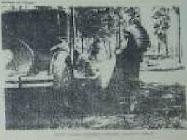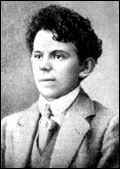From an email to K. Silem Mohammad, whose blog carries some interesting discussion on the concept of poetic "ear":
I've been following the "ear" discussion, & have a few comments.
Often I find myself agreeing with Jeffrey Jullich, though the value of empirical studies (of versification, sound, etc) depends on how you integrate them into some more holistic response. Statistical analyses are pretty similar (a Bell curve) no matter what the topic; unless you combine your data on cloud grayness over Detroit with other factors, you won't know much about the weather. In the case of poetry this does tend to circularity, since a given work's "virtues" inhere in such a symbiotic way as to challenge or defy analysis.
Where I agree with him completely is on this notion of a more inclusive critical vocabulary (the "Quintillian tropes"). It seems to me that the focus on "ear" might be motivated by a search for a means of critical measure within a set of poetic idioms which is already too narrow (post-Language writing) - (ie. referring to J's comment that you could insert lines from various post-lang poems somewhat at random). Here it seems like a literary-historical perspective of some kind is absolutely necessary - but I guess it depends on what you are trying to do. I don't feel the same loyalty to the contemporary alternative poetic idioms that many share in this neighborhood of interest.
If I were to sketch out a literary-historical paradigm, I would see the development in the US of oppositional idioms as both style-forming and community-building. There are 2 layers of opposition : one, sort of superficial, opposes contemporary "mainstream verse culture". The other, more profound opposition, is to the notion of a central or universal (or western) Tradition, a paradigm constructed mainly by Eliot and instituted rather programmatically by the New Critical generation (Tate, Ransom, et al.). This 2nd divide is quite fixed in the US, like the 2 main political parties. The counter-idea to Eliot is that the real American tradition is Emersonian, original, individualistic, even eccentric. The achievements of Whitman, Dickinson, and some of the Moderns are given in evidence of this counter-tradition.
In my view it is precisely this double-layered oppositional stance which undergirds the idiomatic communities (NY School, Language Poetry, Projectivist, Beat, etc.). The strength & vitality of idiomatically-differentiated styles comes at a price : the denial of even a modified version of Eliot's notion of a broad tradition. And it is that denial which contributes most to the lack of a more complex set of critical tools such as Jeffrey noted.
1.03.2003
Labels:
Kasey Mohammad,
poetic schools2,
tradition2
Subscribe to:
Post Comments (Atom)



No comments:
Post a Comment